Tossing and turning while your mind replays work stress, family chaos, or tomorrow’s endless to-do list? You’re not alone. In 2023, 77% of U.S. workers said stress disrupted their sleep, and studies estimate that 10–30% of adults struggle with insomnia, with 1 in 3 facing sleep challenges. No wonder mornings often feel like a slog.
The good news? You don’t need pills to drift off more easily. These five natural sleep tips are backed by science and perfect for busy professionals, parents, or anyone craving quality rest. Try them tonight and say goodbye to sheep-counting.
Why Natural Sleep Habits Work
Quick fixes like sleeping pills may offer temporary relief, but they rarely address the root causes of poor sleep stress, overstimulation, and disrupted circadian rhythms. Natural strategies reset your body and mind, helping you fall asleep faster and stay asleep longer. Let’s explore five proven methods.
1. Put Your Phone Away Before Bed
Your phone is one of the biggest sleep saboteurs. The blue light from screens suppresses melatonin, delaying sleep by up to 1–2 hours. Research shows that reducing screen time before bed shortens “sleep latency” (how long it takes to fall asleep).
What to do:
-
Commit to a no-screen rule 60 minutes before bed.
-
Read a book, journal, or stretch instead.
-
Dim your lights to mimic sunset it tells your brain it’s time to rest.
A small shift, big results: less tossing, more snoozing.
2. Try the 4-7-8 Breathing Method
When stress keeps your thoughts racing, the 4-7-8 breathing technique can reset your nervous system.
How it works:
-
Inhale through your nose for 4 seconds
-
Hold your breath for 7 seconds
-
Exhale slowly through your mouth for 8 seconds
-
Repeat 4–5 cycles
This simple practice lowers heart rate and calms the mind. With consistency, your brain learns to associate it with sleep.
3. Keep Your Bedroom Cool and Dark
Your sleep environment matters more than you think. Research from the Sleep Foundation shows that a bedroom temperature of 16–20°C (60–68°F) supports the body’s natural nighttime cooling process, helping you fall asleep faster.
Tips for an ideal sleep space:
-
Use blackout curtains or an eye mask to block disruptive light.
-
Run a fan, crack a window, or set the AC to cool your room.
-
Keep noise minimal, or use a white noise machine.
Think of it as creating your own spa-like retreat but at home.
4. Stick to a Consistent Sleep Schedule
Your body loves routine. Going to bed and waking up at the same time daily even on weekends helps regulate your circadian rhythm. Over time, your brain starts to expect rest, making it easier to nod off.
How to build the habit:
-
Choose a target bedtime and wake-up time.
-
Add a calming ritual: a warm shower, gratitude journaling, or light reading.
-
Avoid oversleeping on weekends (try to stay within an hour of your weekday wake-up).
This low-effort habit delivers big sleep wins.
5. Use Soothing Sounds to Relax
Sound is a powerful sleep cue. Studies show that gentle music or nature sounds (like rain, waves, or forest ambience) can quiet mental chatter and promote relaxation.
What to try:
-
Instrumental or ambient music (avoid lyrics, which keep the brain active).
-
White noise, pink noise, or nature sounds.
-
High-tech option: neuroVIZR stress relief devices a wearable device combining light and sound to guide the brain into restorative states. A quick 11-minute session can calm the nervous system and prime you for sleep.
Pair soothing sounds with other natural sleep tips, and you’ll fall asleep faster and wake up more refreshed.
Final Thoughts
Improving your sleep doesn’t require drastic changes just small, consistent tweaks: less screen time, a cooler bedroom, a set routine, mindful breathing, and calming soundscapes. Add in tools like neuroVIZR if you want an extra edge.
Start with one habit tonight, then layer in others as you go. In a world where stress never stops, these natural strategies give you back control over your rest. Here’s to waking up energised, clear-headed, and ready for the day.
References
-
American Psychological Association. (2023). Work in America™ Survey: Workplaces as engines of psychological health and well-being.
-
Sleep Foundation. Bedroom Environment: What Elements Are Important? sleepfoundation.org
-
Sleep Foundation. Insomnia and Older Adults. sleepfoundation.org



























Share:
Top Athlete Recovery Techniques: Sleep, HRV & neuroVIZR
The Rhythm Between Heart and Brain: How HRV Shapes Mental Performance